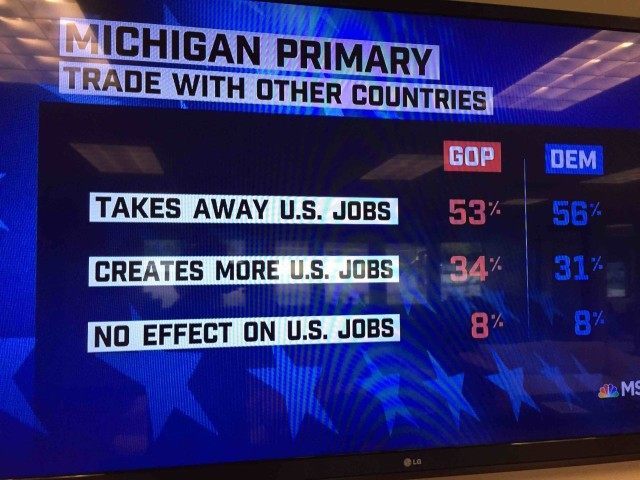The Club for Growth came out against President Donald Trump’s proposed steel and aluminum tariffs on Monday. That much was expected.
What was rather incredible was the Club’s reasoning: it claimed Trump’s tariffs would “help hand the election to the Democrats.”
The reality is that free trade is almost a guaranteed election loser (and I say this as a long-standing free trader who is personally opposed to tariffs in most circumstances, including these).
Since President Bill Clinton, who signed the North American Free Trade Agreement (NAFTA) into law in 1994, no candidate has won the presidency on a free trade platform.
Al Gore, NAFTA’s most prominent early defender, lost to George W. Bush in 2000. President Bush imposed, then lifted steel tariffs, and went on to win re-election in 2004, defeating Senator John Kerry (D-MA), who had a wishy-washy record on free trade (as on most other issues).
Sen. Barack Obama (D-IL) opposed free trade agreements in Congress, and won the presidency in 2008 by running against free trade. His opponent, Sen. John McCain (R-AZ), was in favor of free trade, as was the next Republican nominee, former Massachusetts governor Mitt Romney, who also lost to Obama.
In his second term, Obama flip-flopped on trade, negotiating the Trans-Pacific Partnership (TPP) and trying to reach a free trade deal with the EU.
Hillary Clinton was also a hypocrite on free trade, though in the opposite direction: The former Secretary of State called the TPP the “gold standard” in trade agreements, then ran against free trade deals under pressure from Sen. Bernie Sanders (I-VT) in the Democratic Party presidential primary in 2016. In the general election, Trump called himself a free trade supporter, but ran against existing agreements and promised to raise tariffs, as he is doing.
The problem for free traders is not that their policies are unpopular, but that the benefits of free trade are dispersed across society, while the costs of free trade — in factory closures, for example, which are theoretically temporary — are concentrated. The social scientist Mancur Olson called this the “logic of collective action,” and it was evident in 2016, most notably in the remarkable Michigan Democratic primary, arguably the greatest polling upset of all time.
Clinton led Sanders by 21.4% in the RealClearPolitics poll average before Election Day, but Sanders won by 1.5%. Exit polls of Michigan voters showed that majorities of both Democrats (56%) and Republicans (53%) opposed trade by wide margins — even though trade supports over a million jobs in Michigan. Sanders’s anti-trade message resonated with those voters — and many of them may have quietly crossed party lines to vote for Trump in the end.
Free trade agreements offer great benefits to society as a whole. But they require citizens to place enormous trust in their government — trust that the risk to vulnerable industries will be offset by new investment, or social insurance.
That trust is lacking today, for a variety of reasons — one of which is that our government has not done enough to help those who bore the brunt of previous free trade agreements, while our politicians have largely ignored them.
Theoretically, it is possible that consumers might suffer from Trump’s proposed tariffs before Election Day, for two reasons. First, a tariff is a tax, and it will be paid by the same people who are otherwise enjoying Trump’s income tax cut. Second, U.S. firms could be forced to cut jobs, especially in a trade war.
But those effects, if they happen, will likely take a while. As much as free traders like me might wish otherwise, protectionism wins at the polls.
Joel B. Pollak is Senior Editor-at-Large at Breitbart News. He was named to Forward’s 50 “most influential” Jews in 2017. He is the co-author of How Trump Won: The Inside Story of a Revolution, is available from Regnery. Follow him on Twitter at @joelpollak.

COMMENTS
Please let us know if you're having issues with commenting.